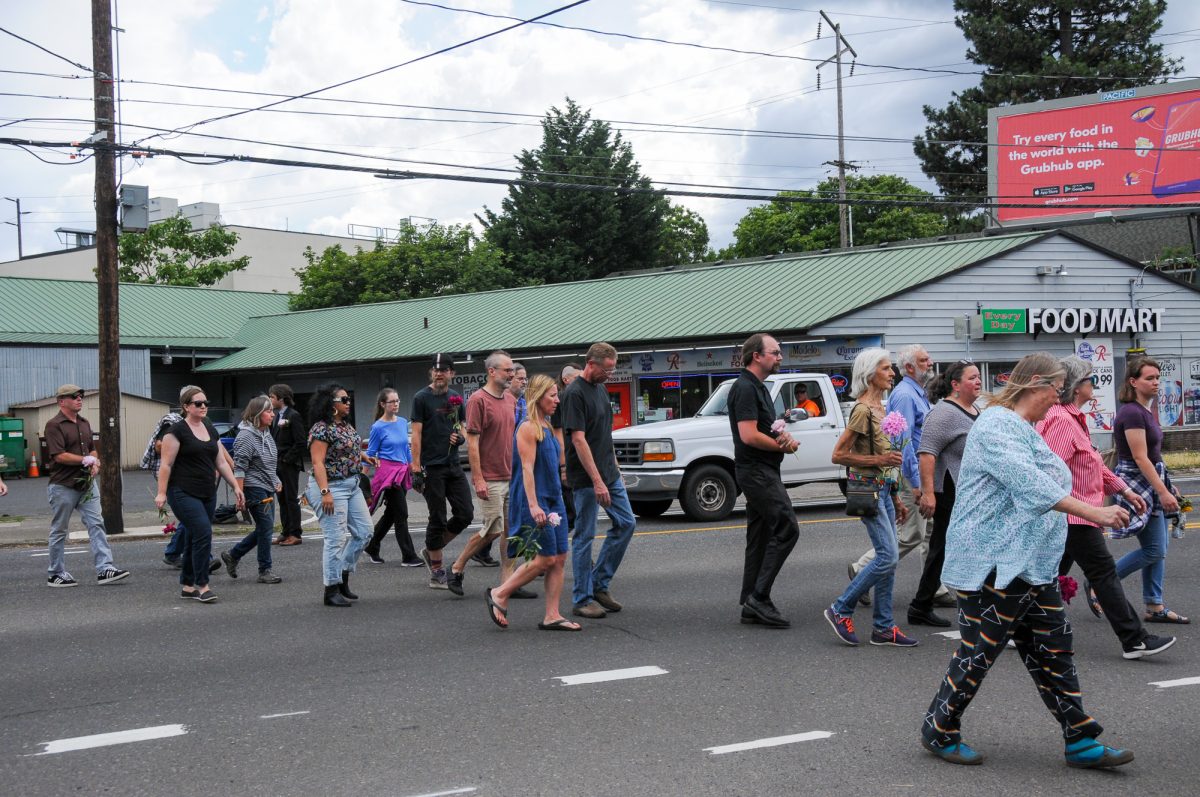
(Photos: J. Maus/BikePortland)
Louanna “Lou” Battams life touched many people in the Mt. Scott-Arleta neighborhood of southeast Portland. The 82-year-old was remembered at a memorial last night as a creative, smart, and selfless person who devoted her later years to helping vulnerable people.
“This event has had a profound impact on our community. It’s a tremendous loss.”
— Matchu Williams, Mt. Scott-Arleta Neighborhood Assoc.
Battams herself was described by neighbors as a strong and capable woman who did projects around her home and garden that inspired people half her age. After decades as a friend to many and a pillar of strength in the community, it was her own vulnerability as a person trying to cross Southeast Foster Road on foot that led to her death. There are no marked crosswalks or signals at the intersection with 71st Avenue where she was struck on June 13th and it’s unclear what happened prior to the collision.
About two dozen people gathered at that intersection last night to remember Battams. Among the crowd were her son, next-door neighbors, people who knew her from her work with the local neighborhood association, and one little girl who told me Lou was her friend.
One of Battams’ next-door neighbors told me she would bring cookies to kids on her street. Another said she walked on and around Foster often to pick up a newspaper or to get to church where she volunteered preparing meals for the homeless. A skilled painter later in life, I learned that Battams had a geology degree and used to fly in helicopters over Mt. St. Helens to study its volcanic activity.
Matchu Williams is co-chair of the Mt. Scott-Arleta Neighborhood Association and would see Battams at neighborhood events. He’s also a leader with BikeLoudPDX, the group that helped organize the event. “Our city has done a lot to make Foster Road safer,” he said into a microphone barely audible over the roar of passing car engines. “But they can do more to protect our community members so we never have to experience loss like this ever again.”
“This event has had a profound impact on our community,” Williams continued. “It’s a tremendous loss.”
Advertisement
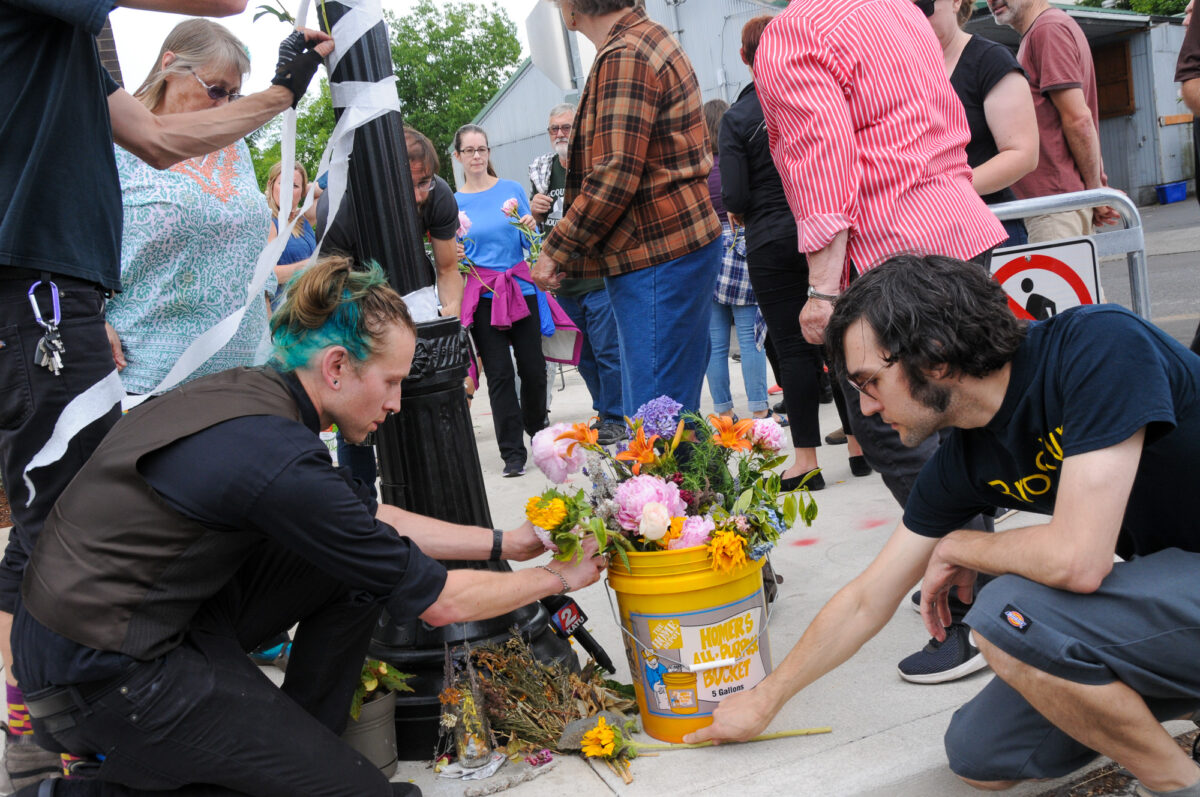
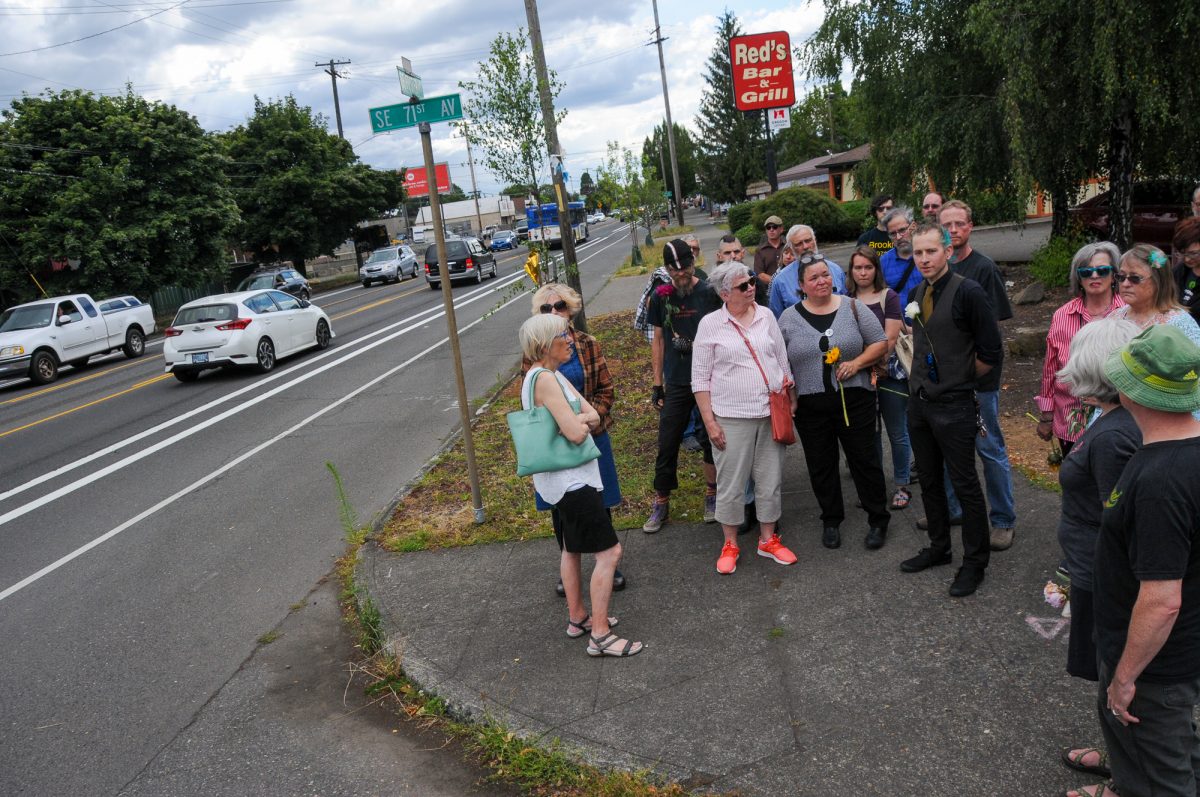
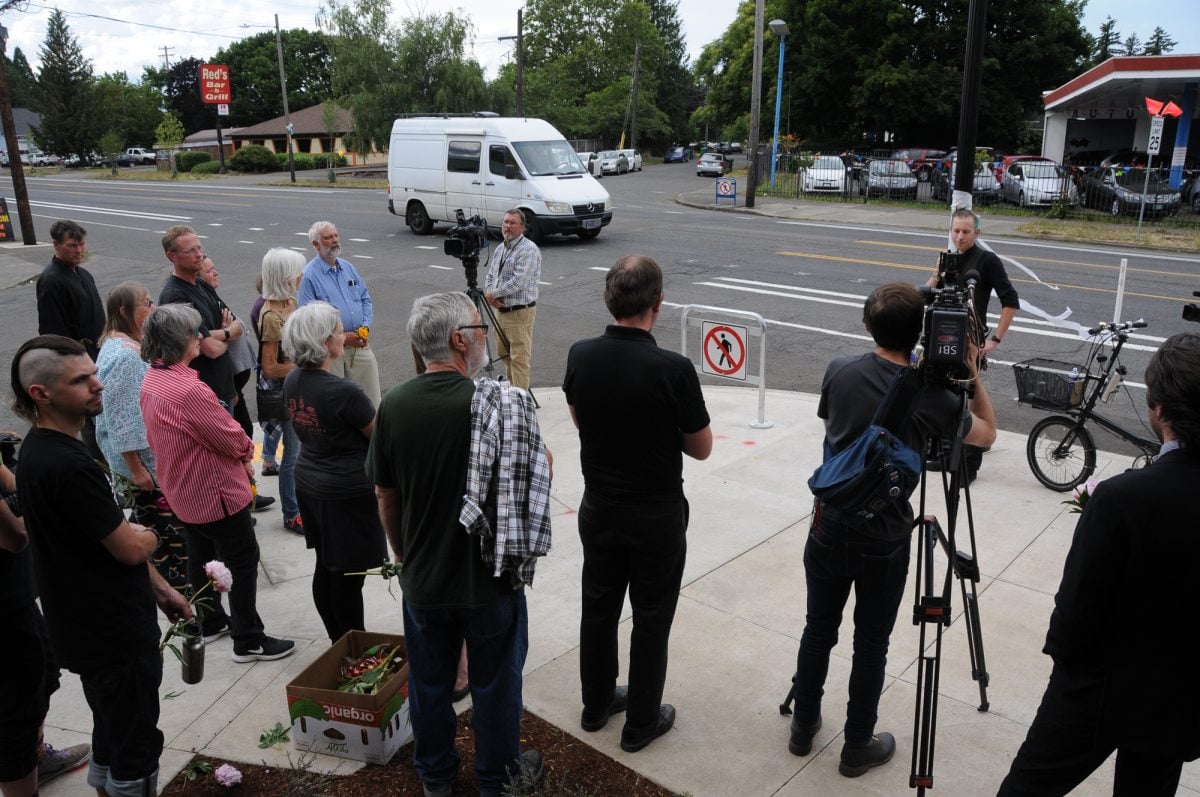
By a cruel irony, Battams was killed just one block away and just 10 hours after the Portland Bureau of Transportation cut the ribbon on Foster’s recent safety updates. But in keeping with their promise to respond quickly to fatal crashes, PBOT has already made several changes to the intersection.
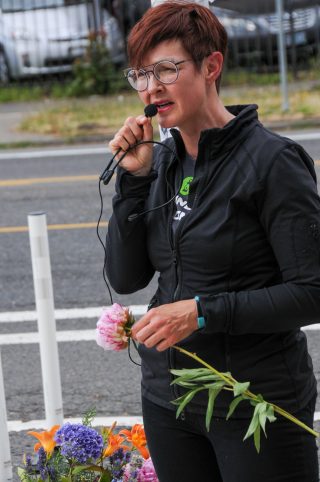
The speed limit on Foster (at least this section) has been reduced from 35 mph to 25 mph. PBOT has installed plastic wands at the corners to prevent drivers from using the bike lane to get around stopped traffic. They’ve also closed the easternmost crosswalk to discourage people from using it (neither crossing at 71st is marked). I’ve reached out to PBOT confirm these changes and find out if anything else is in the works.*
Battams is one of 27 people who have died on Portland roads this year. That number is alarmingly higher than previous years at this same date. In 2018 we had 34 deaths total and 17 by the end of June.
I can only imagine how Battams would have reacted upon learning an innocent person had been killed simply trying to cross the street so close to her home. Given what I learned yesterday, she would have offered to help any way she could. We owe it to her — and everyone else impacted by these tragic, unnecessary deaths — to do the same.
*UPDATE, 4:13pm: PBOT Communications Director John Brady shared a clarification:
“The ‘No Crossing’ signs were not put in because of the fatality. Rather their installation was a condition that had been placed on nearby development. They just happened to be installed right after the fatality. Secondly, the speed limit was reduced to 25 for the construction; we are keeping it at 25 mph while we apply to ODOT for a permanent reduction to 25 mph.”
UPDATE, 6/28 at 8:03 am: PBOT Commissioner Chloe Eudaly has left a comment below that you should not miss:
“Hey Ted [a commenter she’s replying to] and Bikeportland, I am painfully aware of every death on our streets and was heartbroken to learn of Ms. Battam’s death just hours after we celebrated the improvements to Foster. With my support and direction PBOT is doing more than ever to respond to and prevent fatalities. I don’t need emails to raise my awareness or accelerate this work. I need support from my colleagues and their bureaus on our Vision Zero work, I need the legislature to give us the ability to reduce speeds on more of our roads, I need ODOT to improve their roads, or better yet adopt Vision Zero statewide, and I hate to say it but we need more enforcement. PBOT cannot engineer or educate fatalities away entirely (and it’s going to take a long time to correct every shortcoming on our roads). Sadly, there are too many people who will continue to break the law and endanger people’s lives regardless of what we do. We will be installing more speed and red light cameras around the city which dramatically reduce specific behavior but don’t help with distracted or impaired drivers or other rampant and asinine behavior we see on the roads. We have half the number of officers in the Traffic Enforcement Division that we had 10 years ago despite significant population growth and increase in traffic. More than four times the number of people died in traffic fatalities than were murdered in the City of Portland last year. We are not putting our police resources where they are most needed.”
— Jonathan Maus: (503) 706-8804, @jonathan_maus on Twitter and jonathan@bikeportland.org
Never miss a story. Sign-up for the daily BP Headlines email.
BikePortland needs your support.



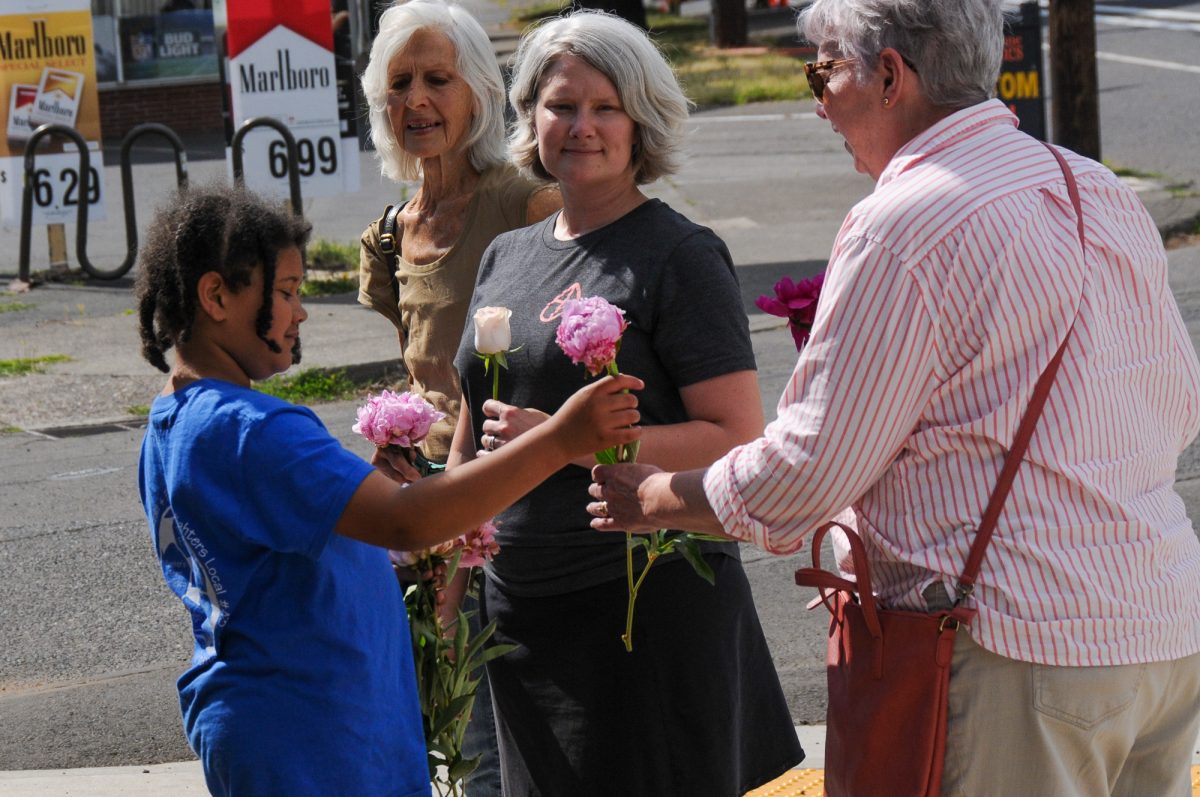
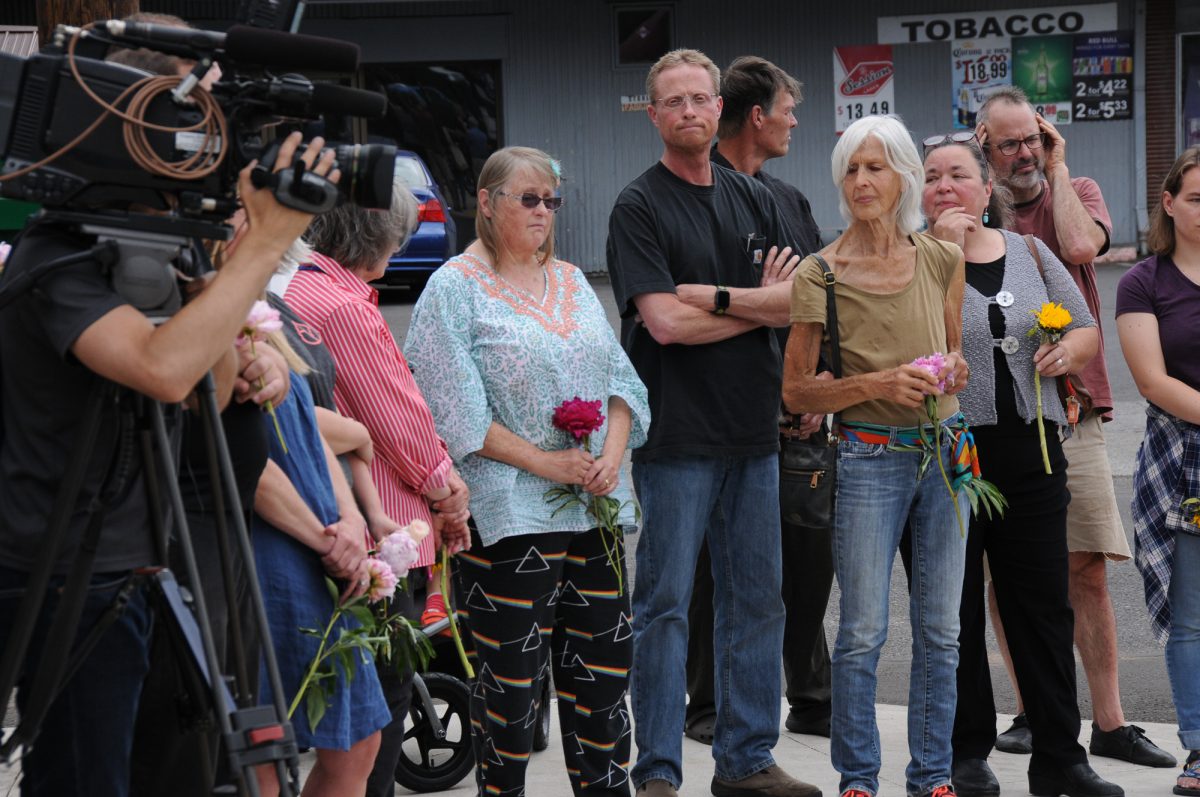
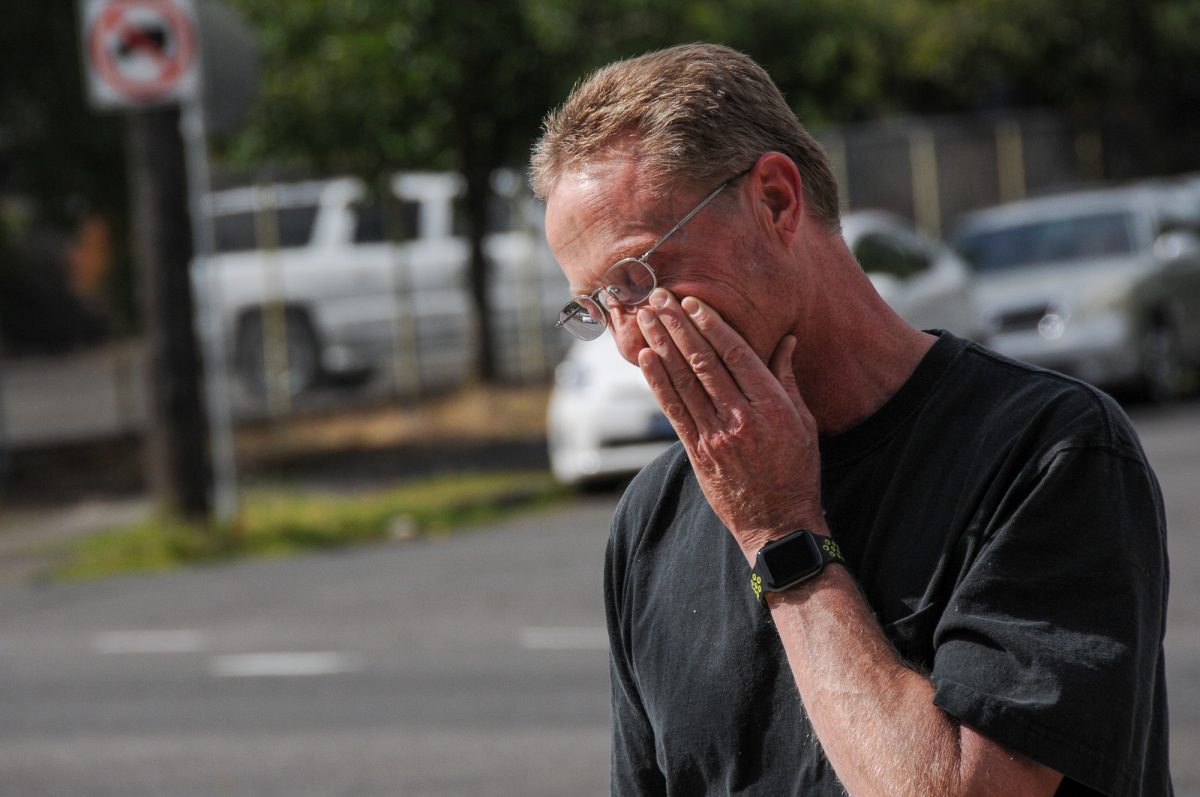

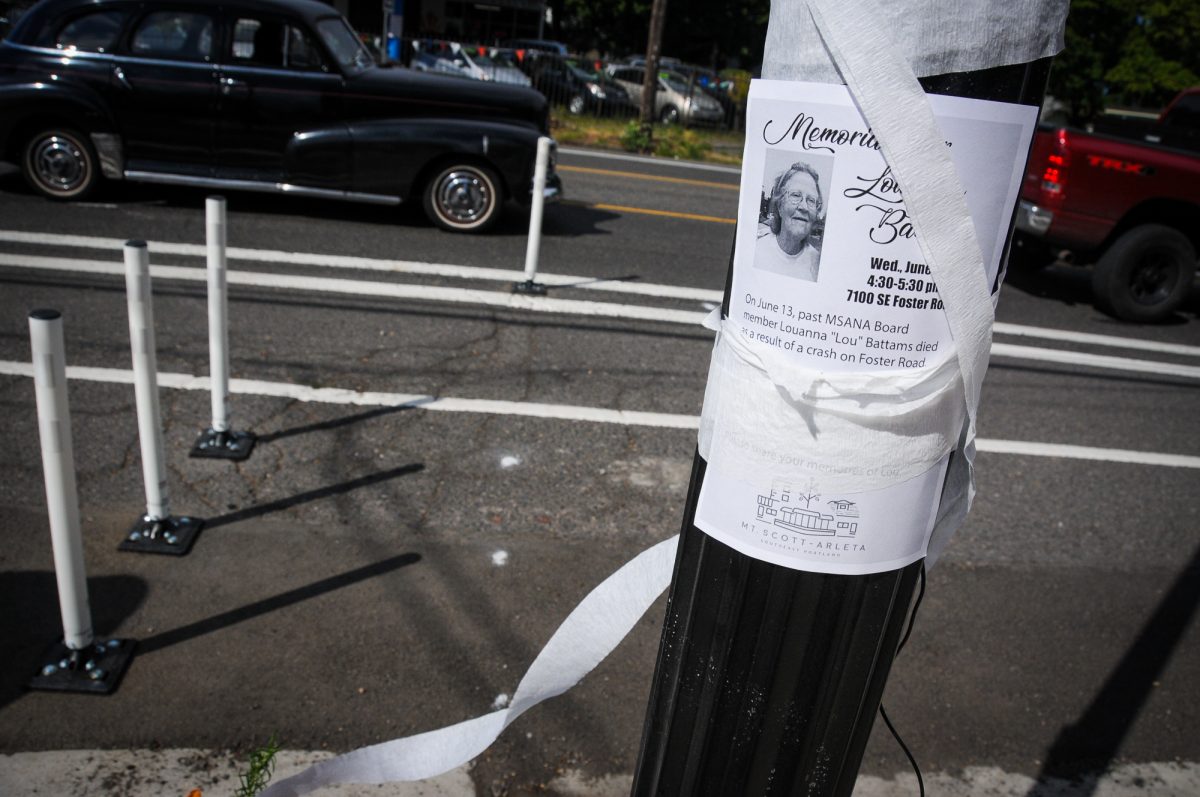

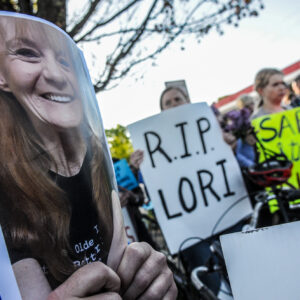
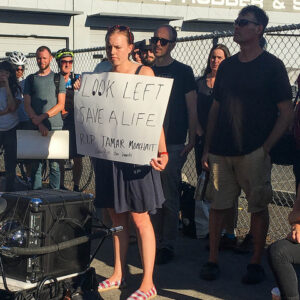

Thanks for reading.
BikePortland has served this community with independent community journalism since 2005. We rely on subscriptions from readers like you to survive. Your financial support is vital in keeping this valuable resource alive and well.
Please subscribe today to strengthen and expand our work.
Jonathan, thanks for covering this event.
And thanks to Matchu Williams, Sarah Iannarone, RJ Shepard and the Mt. Scott Arleta Neighborhood Association for putting the event together.
Everyone, if you are concerned about the dramatic increase in fatal crashes on Portland roads in 2019, consider sending an email to Commissioner Eudaly and ask her to take immediate measures for better safety on our streets. And add any appropriate details, anecdotes, etc. to support your request.
Her email: chloe@portlandoregon.gov
Calling attention to the senseless loss of human life is one of the few ways we can get policymakers to redirect resources toward safety.
Ted Buehler
Co-Chair, BikeLoudPDX
*UPDATE, 4:13pm: PBOT Communications Director John Brady shared a clarification:
Hey Ted and Bikeportland, I am painfully aware of every death on our streets and was heartbroken to learn of Ms. Battam’s death just hours after we celebrated the improvements to Foster. With my support and direction PBOT is doing more than ever to respond to and prevent fatalities. I don’t need emails to raise my awareness or accelerate this work. I need support from my colleagues and their bureaus on our Vision Zero work, I need the legislature to give us the ability to reduce speeds on more of our roads, I need ODOT to improve their roads, or better yet adopt Vision Zero statewide, and I hate to say it but we need more enforcement. PBOT cannot engineer or educate fatalities away entirely (and it’s going to take a long time to correct every shortcoming on our roads). Sadly, there are too many people who will continue to break the law and endanger people’s lives regardless of what we do. We will be installing more speed and red light cameras around the city which dramatically reduce specific behavior but don’t help with distracted or impaired drivers or other rampant and asinine behavior we see on the roads. We have half the number of officers in the Traffic Enforcement Division that we had 10 years ago despite significant population growth and increase in traffic. More than four times the number of people died in traffic fatalities than were murdered in the City of Portland last year. We are not putting our police resources where they are most needed.
“Sadly, there are too many people who will continue to break the law and endanger people’s lives regardless of what we do.”
I respectfully disagree. While cars (often!) behave badly, we know that road design is key in reducing speeding which is the biggest factor in fatalities.
PBOT could have engineered this better. The empty turn & parking lane gives a wide feeling that encourages cars to speed. Parking could be removed at all corners and bulb outs installed made to shorten crossing distances, along with median islands. Painted crosswalks could have been installed. A separated protected bike lane would have effectively narrowed the road.
All those measures would be better than an occasional enforcement action.
Why not a hybrid/Pigovian approach? Step 1: Determine the appropriate vehicular speed for the street. Step 2: Install speed and red light cameras to ticket offenders (making sure to put appropriate guidelines in place). Step 3: Use the revenues from Step 2 to provide (or, in all likelihood, supplement) funding to redesign the street in a way that will result in the appropriate speed identified in Step 1. Rinse and repeat until you achieve a design that results in your desired outcome.
If you read Eudaly’s whole comment, the sentence you quoted makes total sense. She’s not viewing enforcement as a substitute for design, or downplaying the importance of making infrastructure improvements. In the meantime–and even after (if it were possible to rebuild all infrastructure) she’s right that “there are too many people who will continue to break the law and endanger people’s lives regardless of what we do.”
Of course you’re right that infrastructure improvements are better than occasional enforcement, but she’s didn’t say anything in disagreement to that. Both are needed.
Of course my neighbor across the street at the Euro Classic furniture store has been calling the changes to Foster unsafe for months, and this just gave him the opportunity to again put it up on his reader board. But I have lived here since 2000 and have seen a number of people killed here, all by cars either driving too fast or by impaired drivers.
The city of Portland has failed the east side for decades. So glad to see folks out here taking action and standing up for themselves.
And sadly, they will continue to do so but only after they waste more of our money and resources. All the while telling us it is now somehow “safer.”
TED point the anger at Governor Brown activist should call her to immediately get the state police involved. Also contact Tanya Sanchez to initiate with state police #mmiw
First: People, stop dehumanizing the situation: “people killed here, all by CARS either driving too fast”, and “While cars (often!) behave badly” It’s not CARS who are driving or behaving badly, it’s the PEOPLE DRIVING who are driving too fast and behaving badly. Put the onus where it needs to be: People driving are making bad decisions and bad choices, and putting the blame on the cars (brainless mechanical items) takes the blame off the people driving.
Second, If Commission Eudaly feels like she doesn’t have the support of her fellow commissioners, what can we do to change that?
Third: The governor can’t do anything about a Portland-specific issue (when this happens on Portland streets) and frankly, shouldn’t. The state should get more involved in implementing Vision Zero statewide, pushing ODOT to work harder at making roads safer, and crafting laws and budgets to make that happen.
The blame belongs to traffic engineers far more than it does drivers or police. Where is the city traffic engineer to answer for allowing these clearly unsafe conditions to persist? No other engineering discipline would allow Professional Engineers to shirk responsibility like this for deaths caused by their product.
There are well-documented relationships between speed and lane width, and between speed and risk of serious injury or death. And yet, PBOT engineers refuse to design lanes as narrow as 8ft, which would reduce speeds and shorten crossing distances. Engineering is about trade-offs between cost, performance, and safety. All of this ease and convenience provided for driving cars fast comes at the cost of lives (besides all of the other costs drivers don’t cover in road wear, noise, emissions, and inconvenience to everyone outside their car.)
This problem of killing someone with car traffic every 7-10 days is the result of deliberate engineering decisions and it needs to be fixed at the engineering level.
Meanwhile infrastructure doesn’t do anything for the many people that enjoy our roads without any fear of getting pulled over after they had a great night on the town and drinking and smoking bowlskis all night. Road Infrastructure doesn’t change that behavioral. A ticket or maybe and arrest does. Just saw that the driver on 205 last winter who was on mushrooms and drove off of the road and killed her boyfriend got 18 months. This is not a crisis with cars. This is a crisis with our politicians. They don’t have enough backbone to put cops on the street and patrol for people driving under the influence, as well as just terrible driving as a whole.. And while they claim this equity idea, people continue to die. Not putting cops on the street is not the answer to perceived inequity coming from PPB. It is clear that this type of thinking and many more is perhaps the reason that nobody wants to work for PPB.